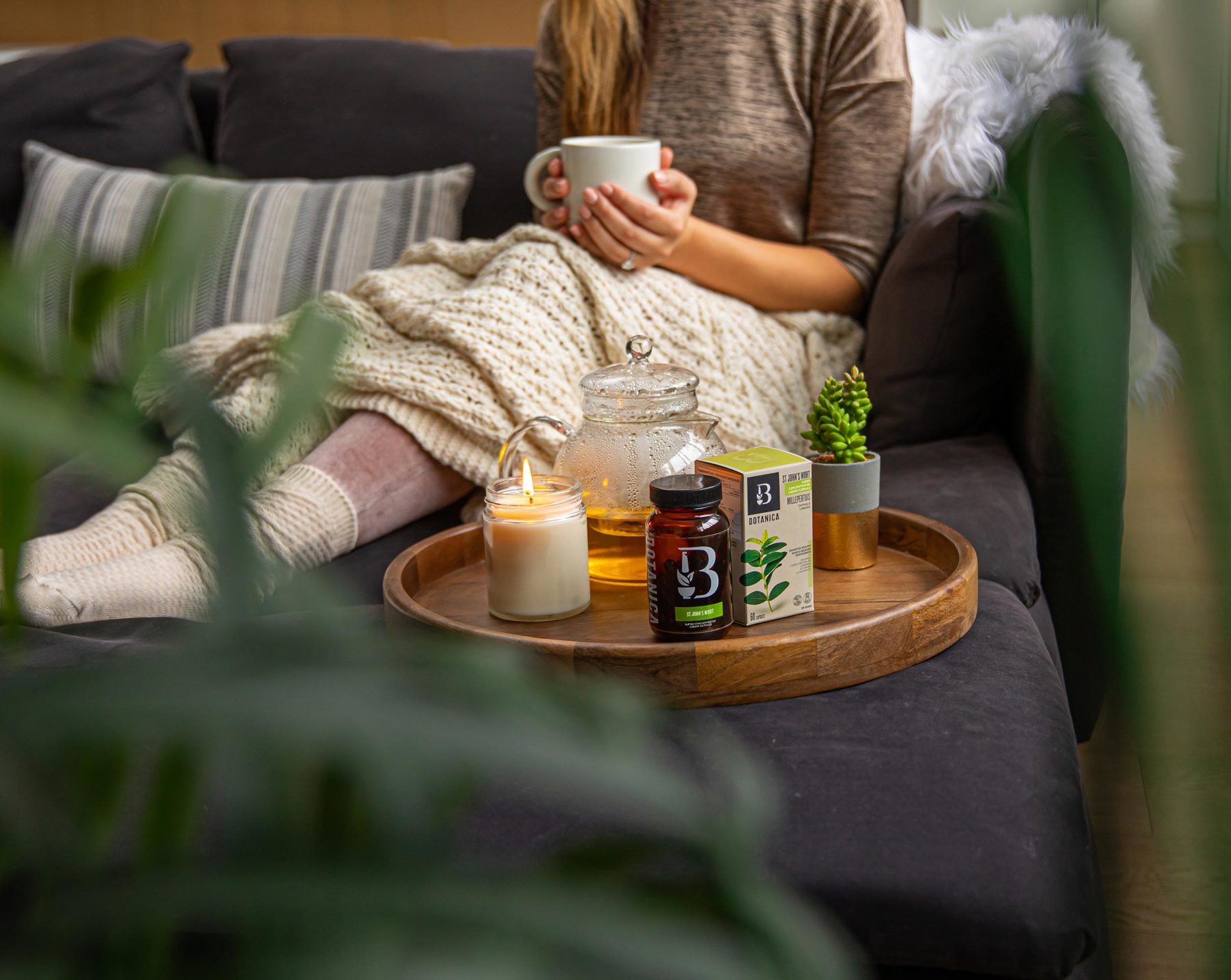Stress and anxiety are such commonplace experiences that they are almost viewed as “normal.” We should just deal with them, right? Wrong. There can be serious consequences when we neglect to manage our stress and anxiety. Chronic (defined as more than two weeks) stress is a significant predictor of disease and mortality. And anxiety, well, it can become debilitating on its own and put us at risk for other serious mental and physical illnesses.
I always say that the first step to managing something is understanding it. So, to better manage stress and anxiety, let’s break down what stress is, how it is connected to anxiety, and how to get a handle on both.
In the simplest terms, stress is any real or perceived threat to your well-being and survival. The stress response, on the other hand, is how your body responds to stress (for example, with anxiety). When we perceive something as stressful, our body releases our two primary stress hormones, adrenaline and cortisol. These work to increase blood sugar and blood pressure to increase the body’s fuel and enhance its delivery to our muscles. As a consequence of the muscles sequestering the body’s sugar, our brain becomes depleted of it – and we get brain symptoms, such as anxiety.
While the experience of stress for an animal is one that maximizes its chance of survival, we humans tend to overthink, and even obsess over perceived stressors (those that are not a threat to our survival). The most common stressors for people are financial strains, relationship problems, body image, and unmet expectations. These are not an imminent threat to survival, however, once our brain determines that something is stressful it launches the exact same stress response used to outrun a bear, for example. So if we’re sitting at home having the same increases in blood pressure, blood sugar, and anxiety, it doesn’t benefit us. It’s almost like we have out-evolved our own stress response. Because this response, strategically curated by our bodies and brains to ensure our survival, is now a major predictor of type II diabetes (a disease of imbalanced blood sugar) heart attacks (often driven by chronically elevated blood pressure), and anxiety (as well as other mental health) disorders.
Stress and anxiety are so multi-faceted, and can be viewed through so many lenses. For me, as a neuroscientist, I look to the brain to help me make sense of the stress response. Then, as a nutritionist I recommend ways for my clients to dampen it.
Here are 7 simple, evidence-based dietary and lifestyle hacks that can help manage stress and anxiety by calming our stress response, and alleviating corresponding anxiety.
1. Add some protein or fat to your carbs.
Did you know that what you eat can help manage stress and anxiety? By adding a protein or fat to a carbohydrate, you can significantly reduce that carb’s glycemic impact (that means how quickly the sugars come out of that carb and enter your bloodstream)? This translates to better energy (which is impacted by our stress levels). Also, because a stressed brain becomes a literal sponge for sugar, this slower, sustained source of fuel also translates to a better mood – with less anxiety. This can be as simple as adding a dollop of plain yogurt to your baked potato, some hemp seeds to your pasta, or a spoonful of nut or seed butter to your toast. Or maybe even, just once in a while, having that candy you’ve been craving BUT adding some raw nuts and seeds to it to lessen its blow to your blood sugar and stress response.
2. Show your adrenals some love.
Our adrenals make our stress hormones cortisol and adrenaline. When our stress response is always on, our adrenals will inevitably need extra support. Vitamin C is used at higher amounts during stressful times, so it is an important vitamin to increase in your diet and/or through supplementation. Ashwaganda is an adaptogenic herb that can help us fight back against the negative impacts of our overactive stress response (by reducing anxiety and stress-induced insomnia). An easy way to include both these adrenal-loving things in your day, together, is through Botanica’s Perfect Protein Elevated Adrenal Support (this will help with my protein hack above, too, while easily adding vitamin C and ashwaganda to your daily routine).
3. Try shrooms (the medicinal kind)!
Medicinal mushrooms are gaining recognition by the scientific community for the ability of their beta glucan compounds to support overall immune function – which, as you may have noticed, takes a big hit after a period of stress [1]. They’re also a great source of prebiotics, special fibres that help build a healthy gut microbiome (which helps regulate our stress coping capability). If you’re wondering how to add medicinal mushrooms to your diet in a simple manner, I recommend Botanica’s Perfect Protein Elevated Adrenal Support, which also contains reishi mushroom.
4. Don’t forget about your ZZZ’s.
The unfortunate truth is that stress and poor sleep go hand-in-hand, each one fuelling the other. When we’re stressed, our sleep suffers; and when we’re not sleeping well, we have a much harder time coping with stressors and keeping our stress response (and corresponding anxiety) in check. I encourage my stressed (and often sleepless) clients to prioritize their pineal gland’s melatonin production (ie. our sleep hormone) in their quest for better sleep and stress coping through sleep hygiene habits such as sleeping in a dark, cool room.
5. Do a digital detox.
Did you know that the average person checks their phone 200 times a day — that’s once every six and a half minutes?!
From a neuroscience perspective, this is because every time you get a “like” or a “follow” your brain dumps out dopamine, your neurotransmitter responsible for drive, motivation and pleasure (and the neurotransmitter I studied in graduate school)! Social media can effectively hijack your brain’s reward chemistry so you are no longer capable of feeling rewarded or motivated in its absence – making it incredibly addictive. Moreover, the platforms and algorithms are constantly changing, becoming a very real (albeit perceived) stressor that initiates our stress response and corresponding anxiety. Also, the unrealistic images of bodies portrayed further add to the problem. A short, but FULL, break from tech can allow your brain to rest and reset. It could be one day or one hour, the goal is to do a “digital detox” that is manageable for you regularly.
6. Get a little more mindful.
Because, yes, mindfulness can rewire the brain (I used to be a skeptic, but am no longer)!
Mindfulness is shown in scientific studies to improve the most common consequences of the stress response, including:
- lowering blood sugar
- reducing risk of high blood-pressure [2]
- improving symptoms of mental illnesses such as anxiety, post-traumatic stress disorder, and depression
One of my favourite brain regions is the amygdala, home to the “fight or flight” centre that our stress response activates. Studies have shown that, after mindfulness practice, not only does the amygdala shrink but the functional connections between the amygdala and the pre-frontal cortex are weakened. This dampens the stress response and reduces anxiety. Getting in the habit of shifting your awareness to your breath whenever you find yourself dwelling on stressful situations is very beneficial, or you can take ten deep breaths before each meal to shift your nervous system out of “fight or flight,” and into the “rest and digest,” mode.
7. Get the “pet effect.”
I am a bona fide animal lover, currently mom to an adorable rescued French bulldog named Magnolia, who was born without eyes. Being greeted by a wet nose and a wagging tail brings instant stress relief. And research has shown that when we pet and play with a dog our brain releases feel-good chemicals including endorphins, dopamine and serotonin [3]. “Prescription puppers,” as I like to call them (or Animal Assisted Therapy in medical talk), help dampen the stress response, relieve depression, and reduce anxiety in people. Because interacting with animals releases those feel good brain chemicals, this can help many people (children to elderly) feel less stressed [4] [5]. If you don’t have your own pet, volunteering at a shelter or fostering for a local rescue can give you a very rewarding “pet effect” too!
So rather than try to avoid stress (spoiler alert: Not going to happen), let’s better manage our stress and anxiety by taking control of our stress response and fighting back against the effects of stress, such as anxiety (and elevated blood sugar and pressure).
References
[1] Akramiene, D., Kondrotas, A., Didziapetriene, J., Kevelaitis, E. (2007). Effects of beta-glucans on the immune system. Medicina (Kaunas), 43(8), 597-606. https://pubmed.ncbi.nlm.nih.gov/17895634/
[2] Nidich, S.I., Rainforth, M.V., Haaga, D.A., Hagelin, J., Salerno, J.W., Travis, F., Tanner, M., Gaylord-King, C., Grosswald, S., & Schneider, R.H. (2009). A randomized controlled trial on effects of the Transcendental Meditation program on blood pressure, psychological distress, and coping in young adults. American Journal of Hypertension, 22(12):1326-1331. https://pubmed.ncbi.nlm.nih.gov/19798037/
[3] Odendaal, J. S., & Meintjes, R. A. (2003). Neurophysiological correlates of affiliative behaviour between humans and dogs. The Veterinary Journal, 165(3), 296-301 https://www.ncbi.nlm.nih.gov/pubmed/12672376
[4] Sollami, A., Gianferrari, E., Alfieri, M., Artioli, G., & Taffurelli, C. (2017). Pet therapy: an effective strategy to care for the elderly? An experimental study in a nursing home. Acta Bio Medica Atenei Parmensis, 88(1-S), 25-31. https://www.ncbi.nlm.nih.gov/pubmed/28327492
[5] Redefer, L. A., & Goodman, J. F. (1989). Brief report: Pet-facilitated therapy with autistic children. Journal of autism and developmental disorders, 19(3), 461-467. https://www.ncbi.nlm.nih.gov/pubmed/2793790





